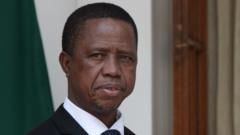The coalition crisis revolves around conflicting fiscal policies, with the ANC pushing for tax increases while the DA calls for spending cuts. Uncertainties loom over the coalition's future amid legal challenges and political tensions.**
Tensions Rise as South Africa's Coalition Government Faces Budget Crisis**

Tensions Rise as South Africa's Coalition Government Faces Budget Crisis**
South Africa's coalition government is under strain following a significant budget vote, highlighting deep divisions between the ANC and DA.**
South Africa's coalition government is experiencing serious tension, with critical divisions laid bare between its leading parties, the African National Congress (ANC) and the Democratic Alliance (DA). This fracturing follows a contentious vote on the national budget, where the centre-right DA opposed a key component, the fiscal framework, mainly due to a proposed VAT increase. Targeting what it characterized as the government's "austerity budget," the DA demanded spending cuts across all departments.
In a show of strategic maneuvering, the ANC emerged victorious in the parliament vote, securing support from various smaller parties to pass the fiscal framework with a tally of 194 votes to 182. The DA has since filed a court challenge to the vote, claiming procedural issues, while party leaders will convene to weigh the future of their involvement in the so-called government of national unity (GNU).
Wits University political analyst Professor William Gumede noted the uncertainty surrounding the DA’s next move. The ongoing court case may dictate whether the DA opts to withdraw from the coalition or remain for the time being.
The coalition, formed less than a year ago after the ANC lost its parliamentary majority for the first time in decades, had been seen as a necessary step toward economic stability, a consensus echoed by South Africa's business sector.
DA spokesperson Willie Aucamp criticized the ANC's refusal to meet the DA's demands, describing it as a "serious infraction." DA federal chair Helen Zille emphasized the party’s commitment to negotiation while calling out the ANC’s intransigence on power-sharing.
The ANC, on its part, accused the DA of "complete betrayal" for opposing the budget. The DAs calculated political decisions led to a rare alignment with populist opposition parties, including those formerly led by Jacob Zuma and Julius Malema, who also opposed the VAT increase due to concerns over its impact on lower-income citizens.
While the ANC justified the tax increase as essential for funding vital public services, they faced criticism as public dissatisfaction concerning service delivery rises. The party also lost previously allied support from the Inkatha Freedom Party (IFP) and ActionSA, which broke from the DA, as they shifted towards collaboration with the ANC.
The implications of this emerging conflict extend beyond internal coalition politics; they threaten to exacerbate economic challenges, particularly amid repercussions from trade tariffs imposed by the United States, which recently accused South Africa of mismanagement.
As the nation grapples with an unemployment rate exceeding 30%, experts warn that a resolution between the battling parties is critical to prevent further economic decline, emphasizing the urgent need for collaboration in navigating South Africa's turbulent economic landscape.






















